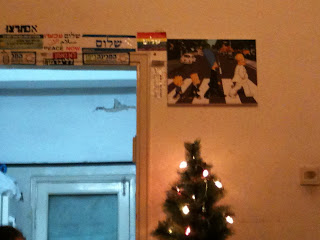On the Way to the Negev
We began heading south on Sunday morning and stopped at Gedera. This low income community is home to many Ethiopian Jews. It was there that we met one of the remarkable women on the trip, Yuvi, who has founded a community of people (Friends by Nature) who permanently live with the long time residents in order to show that not everyone who has been educated leaves the community. We were first treated to the traditional coffee ceremony as a welcome and then discussed the history and current status of Ethiopian Jews.
Preparing for the coffee ceremony
Yuvi herself came to Israel at age 8 after her entire village of Jews (80 people) walked north from Ethiopia into Sudan for one and a half months and then waited for 8 more months before being airlifted as part of Operation Moses. Avi, a teenager who also spoke with us, had an easier time getting to Israel. He was airlifted right from Ethiopia.
Avi plays a traditional instrument which
he later donated as a gift to our synagogue.
Once in Israel, the social services folks descended, criticizing the parenting skills of the Ethiopian mothers and removing the children to boarding schools (similar to how Native American families were treated in the US).
By contrast in Gedera, Yuvi works with families so that they can participate in understanding how to improve their conditions themselves. One of her group's programs called Homework at Home has helped totally eliminate the high school drop-out rate among youth in the community.
After our discussion we were served an Ethiopian lunch. I usually am not a big fan of Ethiopian food and this food was a bit too spicy for me. But surprisingly I liked the spongy bread we were served (thicker and darker than the US restaurants) and the lentils were excellent.
Our Ethiopian lunch
After Gedera, we continued south to the border of Israel and Gaza where we visited a community (Moshav Netiv Haasarah) that is right on the border. Honestly, this was the scariest part of the trip for me. Our host, Raz, was born into this community of 60 families when it was located in the Sinai Peninsula and then relocated into its current location when Israel gave the Sinai back to Egypt. It is a lovely community, sort of a modern version of the kibbutz with a number of community services but much less collectivity. A closer look at the community and you get a better idea of what life is really like. Sensors at the border sound a siren every time a rocket is launched from Gaza. At that point, the residents have 15 seconds to get to one of the many bomb shelters in order to be protected. Raz's 4 year old son already knows the location of the bomb shelter adjacent to the playground. Unfortunately, if a mortar is launched instead of a rocket, then there is no siren, no warning.
A bomb shelter (right) next to the playground.
Raz grew up with the Palestinians. They worked on his father's farm and he played with their children in Gaza. He told us he wants peace ("if they are happy, I am happy") but he also said "if someone steps on your toe again and again, sooner or later you are going to kick him." He then took us right to the border, where we stood on a cliff looking directly at the concrete wall.
The wall at the border and Gaza beyond.
This whole part of the trip terrified me. I looked around and could not find a safe place. What if I just stayed on the bus? It's very visible, it could be attacked. What if I went with the group? Then I'm in a group of vulnerable people. What if it's a mortar and there is no warning? What if something happened to my son?
Part of the community's collection of rockets that have been launched at them.
I have to admit that I stood out as being the fearful one in the group. It made me realize that I had no idea how this could be someone's ongoing way of life, even though they have the choice to leave and not have to live this way. While we have had to wrestle with many complexities during this trip, I would say that so far this is the one that has stumped me the most. I was relieved when we were on our way moving farther inland.
Rabbi Kleinbaum and Raz displaying a box of cherry tomatos grown on his farm.
Our final stop for the day was the kibbutz (Kibbutz Mashabei Sade) where we spent the next two nights.














